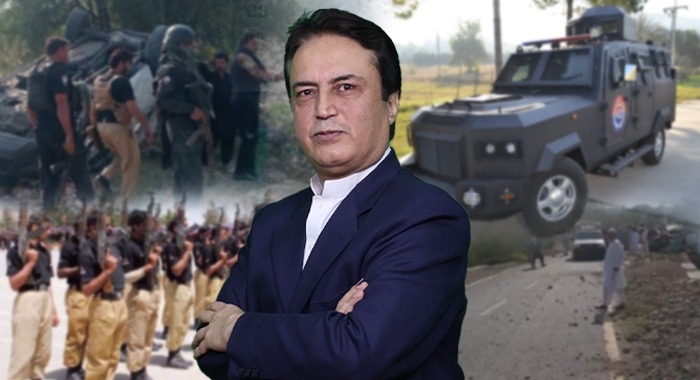Arif Yousafzai
The security situation in Khyber Pakhtunkhwa remains as volatile and alarming as ever. Only a few moments before this discussion, two devastating bomb blasts struck the Hangu district, claiming the lives of a police superintendent, his gunman, and a constable, while several others were injured. This is no longer an exception it has become a grim daily reality for the people and security forces of Khyber Pakhtunkhwa. Despite countless intelligence-based operations and counterterrorism actions, militancy continues to spread from the border regions to the heart of our cities. The province stands exposed to the twin threats of terrorism and political non-seriousness.
At a time when Pakhtunkhwa faces an existential threat from militancy, the provincial and federal governments are embroiled in controversies over bulletproof vehicles and protocol politics. Recently, Provincial Chief Minister Sohail Afridi refused to use bulletproof cars provided by the federal government, calling them “junk” and “useless.” The issue quickly escalated into a political spectacle, with both sides trading accusations of insincerity. If these vehicles were indeed found unfit after forensic testing, then returning them was justified. However, if they were serviceable, rejecting them amid an ongoing terror wave reflects a deeper malaise the absence of seriousness in governance.
One must question why the Inspector General of Police received the vehicles from the Interior Minister if there were concerns about their quality. If these cars were indeed defective, proper inspection and documentation should have preceded their acceptance. Instead, the matter has been turned into political theater, discussed in the media as if it were a petty scandal rather than a matter of provincial security. This trivialization of critical issues shows how detached the political leadership has become from the province’s ground realities, where police officers are being martyred almost daily.
Unfortunately, this attitude of non-seriousness is not new for Pakistan Tehreek-e-Insaf (PTI). The party’s politics, from its leadership under Imran Khan to its provincial manifestations, has often been marked by inconsistency, impulsiveness, and irresponsibility. The same traits that led to administrative paralysis during PTI’s years in power are now visible in its provincial governance. Despite being in office for over a week, the new KP cabinet is yet to be formed. The entire government machinery currently revolves around one man Chief Minister Sohail Afridi leaving the province without a functional administrative structure at a time of heightened insecurity.
This pattern mirrors PTI’s earlier governance failures in Punjab under Usman Buzdar, where corruption, nepotism, and incompetence defined the tenure. When leaders treat governance as an afterthought, they cannot expect their provinces to function efficiently or their people to feel secure.
However, it would be unfair to place all the blame on the provincial government. The federation also bears a heavy share of responsibility. Historically, Islamabad has failed to fulfill its commitments to Khyber Pakhtunkhwa whether it is the payment of net hydel profits, the tobacco cess, or the implementation of promised development projects under the PSDP framework. The federal government’s indifference has bred resentment, while the province continues to suffer from financial deprivation and administrative neglect.
When the center supplies essential resources like vehicles, energy, or funds, these must be handled transparently and responsibly not turned into tools of political confrontation. The lack of coordination between Islamabad and Peshawar has widened the governance gap, leaving security agencies overstretched and citizens vulnerable. The recent controversy over bulletproof vehicles is merely a symptom of this deeper dysfunction.
Moreover, the province’s economic grievances remain unresolved. Khyber Pakhtunkhwa produces over 6,000 megawatts of electricity but consumes only about half of it. Yet, the people of the province pay the same high electricity tariffs as regions dependent on thermal and imported fuels. The same applies to natural gas a resource produced in abundance here but scarcely available to its residents. When Punjab blocks the movement of wheat and flour into Khyber Pakhtunkhwa, bread prices skyrocket, exposing the ordinary citizen to more suffering. These injustices deepen the sense of deprivation and fuel alienation among the people of Pakhtunkhwa.
It is time for both the federal and provincial governments to abandon political point-scoring and act with maturity. The federation must treat Khyber Pakhtunkhwa not as a peripheral region but as a crucial frontline province that deserves fair treatment and immediate redress of its financial and administrative grievances. Simultaneously, the provincial leadership must shed its non-serious attitude, form a competent cabinet, and prioritize security and governance over optics and rhetoric.
The challenges facing Khyber Pakhtunkhwa are too grave for political games. The lives of police officers, security personnel, and citizens are at stake. Both federal and the provincial government must act responsibly and cooperatively to secure this province, restore public confidence, and address the long-standing inequities that continue to endanger Pakistan’s stability.





